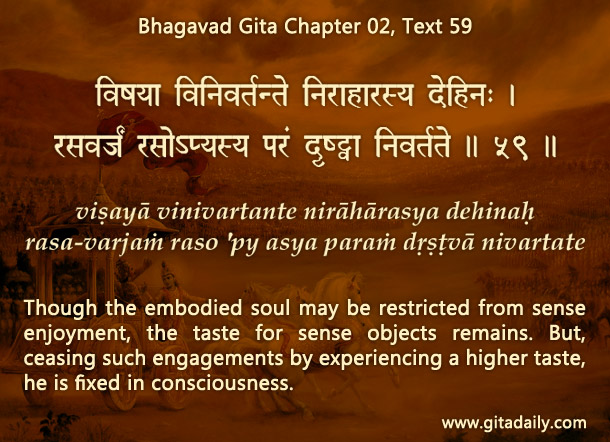Whenever we try to do anything worthwhile, we need to discipline ourselves, especially in terms of giving up something that seems enjoyable initially, even though its consequences are eventually undesirable. As indicated in the Bhagavad-gita 18.38, things that taste like nectar initially often taste like poison eventually.
We know we shouldn’t indulge in activities such as overeating or binge-watching TV, or excessive drinking. But “shouldn’t” doesn’t always translate into “wouldn’t.” Even when it does, and we refrain from indulgence, we are still filled with feelings of deprivation and resentment. We feel as if we have been kept away from something that we need, want, or even deserve. Indeed, we feel as if we are starving, as indicated in the Bhagavad-gita 2.59, by its use of the word niraharasya.
Any form of discipline is difficult and demanding initially, but it is rewarding eventually, provided the discipline is directed towards something worthwhile. Among the various things that we can discipline ourselves in, discipline in meditation can be especially rewarding—not just in the long run but also in the medium run. When we learn to focus our consciousness on the ultimate reality, Krishna, through our practice of meditation, the resulting sense of connectedness provides a non-material satisfaction that replaces the previous feeling of deprivation. Beyond just the feeling of satisfaction, as our absorption in Krishna’s all-attractive features increases, we start experiencing an ineffable yet undeniable enrichment that completely drives out any previous feelings of resentment we might have harbored.
Instead of being disempowered by feelings of deprivation and resentment, we are, through our disciplined practice of meditation, empowered by feelings of satisfaction and enrichment. Over time, we find that this sense of connectedness with Krishna starts staying with us beyond the moments of meditation. Even if that sense of connectedness doesn’t stay with us with the same strength throughout, it remains to some degree and makes discipline in other areas of life easier.
The Bhagavad-gita (2.61) refers to this experience of a higher reality — an awareness of that reality, and of our place and purpose within it — as param drishtva. It is a higher vision that gives rise to a higher purpose and eventually a higher taste.
Summary:
- Whenever we try to discipline ourselves, especially by giving up something enjoyable, we are often burdened by feelings of deprivation and resentment.
- Discipline in meditation connects with a higher reality, wherein we experience a higher vision, followed by a higher purpose, and culminating in a higher taste.
- Through that sense of divine connectedness, we become empowered by feelings of satisfaction instead of deprivation, and enrichment instead of resentment.
Think it over:
- Whenever we try to discipline ourselves, what feelings tend to burden and sabotage us?
- How does discipline in meditation replace these burdensome feelings?
- How does discipline in meditation help us to become disciplined in other areas of life as well?
***
02.59 Though the embodied soul may be restricted from sense enjoyment, the taste for sense objects remains. But, ceasing such engagements by experiencing a higher taste, he is fixed in consciousness.


Leave A Comment